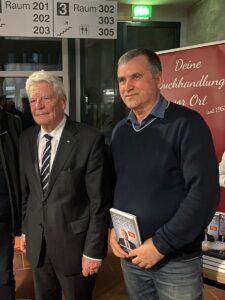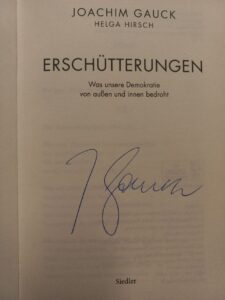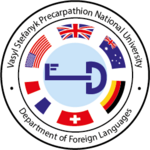

At a recent event at the Viadrina Centre of Polish and Ukrainian Studies, which was a part of the interdisciplinary Jerzy Giedroyc Scientific Colloquium, significant figures gathered to discuss current issues affecting democracy. Among the notable participants was Joachim Gauck, former President of Germany (2012-2017), who delivered a special lecture highlighting both external and internal threats to democracy. His new book “ERSCHÜTTERUNGEN. Was unsere Demokratie von außen und innen bedroht” (“SHAKINGS. What threatens our democracy from the outside and inside”) served as the basis for an in-depth analysis of the state of modern democratic institutions.
President Gauck focused on three different periods of his life, each representing a unique experience with democracy: initially as a citizen of the GDR with aspirations towards democracy, then as an active politician in reunified Germany, and finally, experiencing challenges in contemporary German democracy, which, in his words, shows clear weaknesses. This provided a unique context for his assessment and critique of the political decisions of both the old and new German governments, particularly concerning issues related to Ukraine.
Gauck argued that a true understanding of democracy requires not only active participation but also critical analysis by citizens. He urged all present not just to follow political declarations but to independently analyze and assess various political decisions and directions. This approach underscores the need for responsibility and involvement of every citizen in processes that shape state policy and public sentiment.
Vasyl Tkachivskyi, the head of the foreign languages department, also took an active part in the discussions, enriching the conversation from the perspective of academic research and interaction between Poland and Ukraine. This demonstrated the depth and diversity of views on democratic issues presented at the event.
The event was moderated by Andriy Portnov, co-director of the center for Polish and Ukrainian studies, whose role ensured productive discussions. He played a key role in creating a platform for discussion and analysis, where everyone could express their thoughts and share convictions.
In conclusion, the event at the Viadrina Centre underscored the relevance of the topic of democracy in the modern world and highlighted the need for a deeper understanding and participation in shaping the future of democratic societies. Joachim Gauck’s speech, especially with his personal impressions and political experience, added significance and weight to this event, motivating all attendees to engage actively in discussion and reflection.
